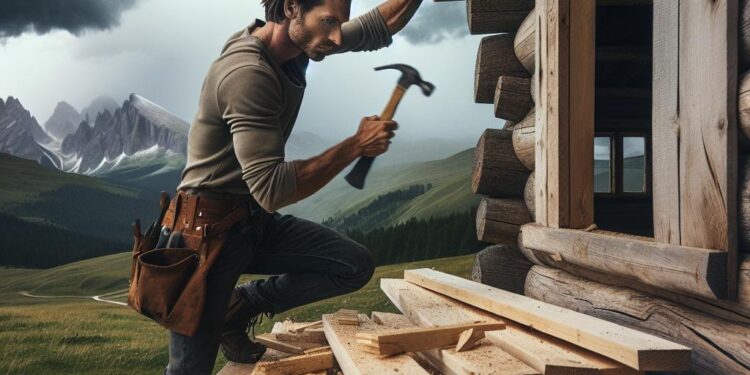Weathering natural disasters can be daunting, especially when your refuge is a humble cabin nestled in the wild. Understanding how to reinforce a cabin against natural disasters is crucial for survival and offers peace of mind when you’re miles from common amenities. Whether dealing with ferocious storms, snow loads, or wildfires, mastering these skills could mean the difference between safety and ruin. Often, folks overlook basic reinforcement techniques like securing roof shingles or anchoring structures. This blog aims to demystify these tasks with straightforward guidance and practical solutions, ensuring you’re ready for whatever Mother Nature hurls your way. After all, preparedness is key to thriving in the wild!
How Can You Reinforce a Cabin for Disasters?
Reinforcing your cabin against natural disasters is all about building a sturdy fortress in the wild—a place that’ll stand strong when Mother Nature throws her worst at you. Imagine you’ve trekked miles into the woods, and your cabin is your only shelter when a storm roars through. Preparing means you’re not just stacking logs but creating a safe haven. Those log walls aren’t only for privacy; they’re your first line of defence against high winds. Adding storm shutters to the windows? That means you’re thinking ahead to keep flying debris from smashing through. It’s like applying the principles of bushcraft on a grander scale, where every nail and board contributes to keeping you and your gear intact. For anyone keen on off-grid living, these precautions tie into broader survival and emergency prep strategies, ensuring your little woodland retreat remains standing, whatever nature has in store.Protecting Your Cabin from Nature’s Fury
Surviving in the wilderness and reinforcing a cabin against natural disasters share a common goal: ensuring safety and preparedness. Here’s how knowing the latter can improve your chances in the wild:-
1. Enhanced Safety: By reinforcing a cabin, you minimize damage from harsh weather, keeping the environment stable and safe, which is crucial in an emergency.
2. Long-Term Survival Readiness: Building strong foundations and secure structures defends against unpredictable conditions, improving your preparedness for long-term survival situations.
3. Efficient Use of Gear: When your shelter withstands nature’s elements, you can focus on efficiently using your survival gear for other purposes, like finding food or water.
4. Health Preservation: A well-secured shelter prevents injuries from structural failure during natural disasters, protecting your health and conserving first aid supplies.
5. Reduced Modern Reliance: Learning to reinforce cabins cultivates self-reliance, reducing dependence on modern conveniences in survival scenarios.
6. Improved Mindset: Reinforced cabins can enhance peace of mind, allowing you to focus on thriving rather than merely surviving.
7. Effective Emergency Management: With a solid structure in place, you can better allocate resources in an emergency without the added stress of rebuilding or constant repair.
Daily Cabin-Strengthening Tips from Disaster Insights
– Building a strong, safe space is crucial, whether in a city flat or a countryside cabin. Begin by using sturdy materials for new structures or reinforce existing walls with them. This practical tip helps withstand various natural disasters and gives peace of mind.– Regularly inspect and maintain your home’s structure, checking for wear or weaknesses that might be unsafe during severe weather. In urban areas, this could mean examining your high-rise block’s windows, while rural residents might focus on their roof beams.
– Keep an emergency supply kit nearby. It doesn’t matter if you’re urban or rural; having essentials like spare food, water, and first-aid kits at hand could be a lifesaver during unexpected events.
– Improve your readiness by participating in local safety drills and emergency preparedness programs. It benefits all, teaching efficient evacuation routes and survival techniques adaptable for both city folks and country dwellers.
DIY Tips & Guided Insights for Reinforcing Your Cabin
1. Secure the Roof: Use durable materials such as metal sheets for the cabin roof to withstand heavy rain and wind.2. Reinforce Windows and Doors: Attach storm shutters or use plywood to cover windows during storms. Ensure door frames are solid and well-fitted.
3. Anchor Down: In areas prone to floods, elevate the cabin and anchor it to its foundation. Use straps or chains for added security.
4. Emergency Preparedness: Always have an emergency kit ready, including first-aid, water, and food supplies.
5. Expert Help: For campers facing unpredictable weather or remote workers in secluded areas, consider consulting a survival course or a professional for advanced gear and construction techniques.
Budgeting Time and Money for Cabin Reinforcements
Preparing to reinforce a cabin against natural disasters requires careful planning regarding the financial investment and time commitment involved.| Aspect | Cost/Time Efforts |
|---|---|
| Learning Basic Techniques | Approx. 20-30 hours of self-study or courses |
| Structural Reinforcement Materials | £200-£500 depending on construction quality |
| Windows and Doors Reinforcement | £100-£250 for materials like storm shutters |
| Roof and Wall Strengthening | £300-£700 for durable materials |
| Training for Proper Installation | 5-10 hours if using online or community courses |
| Ongoing Maintenance | Minimal cost; approx. 5 hours annually for checks |
| Emergency Preparedness Kit | £50-£150 for essential items |




